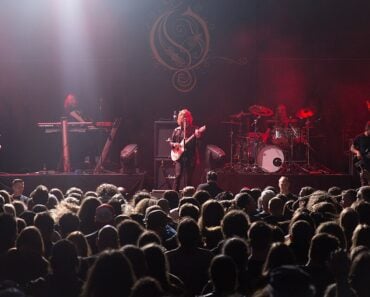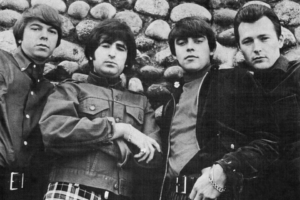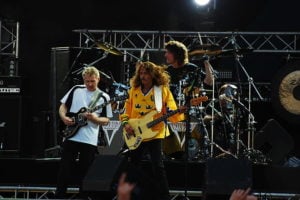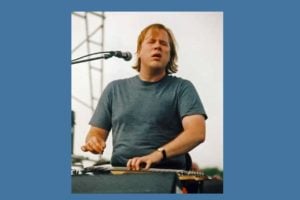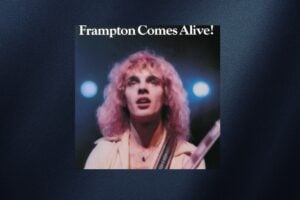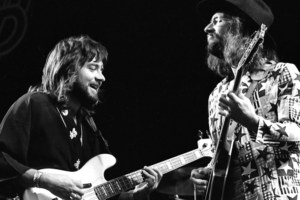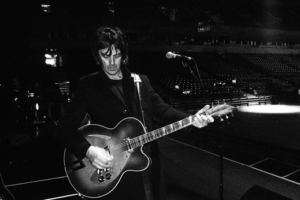
Feature Photo: Andrew King, CC BY-SA 2.0 <https://creativecommons.org/licenses/by-sa/2.0>, via Wikimedia Commons
Formed in Wolverhampton in 1964, Slade would go on to achieve 17 consecutive top 20 hits and six number ones on the UK Singles Chart between 1971 and 1976, making them the most successful British group of the 1970s based on singles sales. The band has released over 30 albums throughout their career, with their best-selling single “Merry Xmas Everybody” selling over one million copies and becoming a perennial Christmas classic that continues to generate substantial royalties decades after its release.
The original lineup remained remarkably stable from 1966 to 1992, a testament to both their musical chemistry and personal bonds forged in the working-class communities where they grew up. During their peak years in the early 1970s, Slade sold more than 50 million records worldwide and became known for their deliberately misspelled song titles like “Cum On Feel the Noize” and “Mama Weer All Crazee Now,” their flamboyant stage costumes, and their ability to create anthems designed specifically for audience participation. After the departure of original members Noddy Holder and Jim Lea in 1992, the band continued in various forms, initially as Slade II before reverting to simply Slade in 1997, maintaining an active touring schedule primarily in Europe while introducing new members to carry on the band’s legacy.
The band’s influence extends far beyond their commercial success, inspiring artists across multiple genres including punk pioneers the Sex Pistols and the Ramones, grunge icons Nirvana and the Smashing Pumpkins, and glam metal bands like Kiss and Twisted Sister. Their 1980 performance at Reading Festival, where they replaced Ozzy Osbourne at the last minute, proved to be a career-defining moment that introduced them to a new generation of heavy metal fans and reinvigorated their careers after a period of declining popularity in the late 1970s. Today, Slade continues to tour with Dave Hill as the sole remaining original member, joined by newer musicians who help preserve the band’s distinctive sound and high-energy live performances.
Noddy Holder
Neville John “Noddy” Holder was born on June 15, 1946, in Walsall, Staffordshire, and became the unmistakable voice and primary frontman of Slade from 1966 to 1992. Before joining the band that would make him famous, Holder played guitar and contributed vocals in Steve Brett & the Mavericks, who were signed to Columbia Records and released three singles in 1965. His path to Slade began when Don Powell and Dave Hill, impressed by his powerful voice and stage presence, repeatedly approached him to join their group The ‘N Betweens, though he initially declined their offers twice before finally agreeing in 1966.
Holder’s 26-year tenure with Slade saw him co-write the majority of the band’s material with bassist Jim Lea, including all six of their UK number one hits. His distinctive, raspy voice could cut through stadium noise and his songwriting partnership with Lea produced some of the most recognizable anthems in British rock, from “Coz I Luv You” to “Cum On Feel the Noize” to the timeless “Merry Xmas Everybody.” His vocal contributions were particularly notable on albums like “Slayed?” (1972), which topped charts in multiple countries, “Old New Borrowed and Blue” (1974), and “Slade in Flame” (1974), where his powerful delivery helped define the band’s signature sound. Holder was also known for his flamboyant stage presence, including his famous mirrored top hat, which he reportedly purchased from a young market trader named Freddie who would later become Freddie Mercury of Queen.
After leaving Slade in 1992 due to exhaustion from constant touring and managing the band’s day-to-day affairs, Holder successfully transitioned into television and radio work. He starred as music teacher Neville Holder in the ITV comedy-drama series “The Grimleys” from 1999 to 2001, hosted radio shows on Piccadilly 1152 and Key 103 in Manchester throughout the 1990s, and appeared on various television programs including “A Question of Pop” and “Noddy’s Electric Ladyland.” He published his autobiography “Who’s Crazee Now?” in 1999 and was awarded an MBE in 2000 for his services to show business. More recently, Holder has made cameo appearances in shows like “Mrs Brown’s Boys” and has been involved in various charity events. In 2018, he was diagnosed with oesophageal cancer and given six months to live, but underwent experimental chemotherapy treatment and has continued to make public appearances while maintaining a positive outlook on his health challenges.
Jim Lea
James Whild “Jim” Lea was born on June 14, 1949, in Wolverhampton, and served as Slade’s bassist, keyboardist, violinist, and primary songwriter from the band’s formation until 1992. His musical journey began early when he joined the Staffordshire Youth Orchestra in 1961 and gained first-class honors in a London music school practical exam before progressing to piano, guitar, and eventually bass guitar. At age 16, he successfully auditioned for The ‘N Betweens, leaving school immediately to join the band that would eventually become Slade, with his multi-instrumental abilities making him an invaluable member of the group.
Lea’s contributions to Slade extended far beyond his bass playing, as he co-wrote most of the band’s material with Noddy Holder and played multiple instruments on their recordings. His bass work was characterized by a unique, melodic approach that didn’t follow traditional bass playing conventions, often incorporating distortion and extremely fast playing techniques that created his distinctive style. He played on all of Slade’s major albums, including “Slayed?” (1972), “Old New Borrowed and Blue” (1974), “Slade in Flame” (1974), “Nobody’s Fools” (1976), and “We’ll Bring the House Down” (1981), contributing not only bass lines but also violin, keyboards, and backing vocals. His violin playing became particularly notable on tracks like “Coz I Luv You,” where his energetic, often behind-the-head Hendrix-style violin performances became a signature element of Slade’s live shows.
Following his departure from Slade in 1992, Lea largely retreated from the music industry, though he remained creatively active. He released a solo album titled “Therapy” in 2007, showcasing a more thoughtful, considered musical direction compared to Slade’s terrace anthems. In 2018, he released a six-track EP called “Lost In Space,” which featured songs written before his cancer diagnosis but recorded afterward, though he noted that treatment had permanently affected his singing voice. Lea has made only two professional live appearances since leaving Slade, including a charity event at the Robin 2 venue in 2002 and a brief performance in the Midlands in recent years. He was awarded the Gold Badge of Merit by the British Academy of Composers and Songwriters in 2001 and has maintained his privacy while occasionally reuniting with former bandmates for recording projects, including a 2022 collaboration with Don Powell and members of their pre-Slade group The ‘N Betweens.
Dave Hill
David John Hill was born on April 4, 1946, in Flete House, Holbeton, Devon, but moved with his family to Penn, Wolverhampton, when he was just one year old. As the sole continuous member of Slade from its formation to the present day, Hill has remained the keeper of the band’s legacy and the driving force behind its continued existence. His journey with what would become Slade began in 1964 when he and drummer Don Powell formed a band called The Vendors, which evolved into The ‘N Betweens before eventually becoming Slade in 1969.
Hill’s guitar work defined much of Slade’s sound throughout their classic period, contributing to all of their major albums from “Play It Loud” (1970) through “You Boyz Make Big Noize” (1987). His most famous guitar was the “John Birch Superyob,” built in 1973, which became an iconic instrument in glam rock history and was later owned by Marco Pirroni of Adam and the Ants. Hill’s distinctive playing style and flamboyant stage presence, characterized by outrageous costumes and his famous “pudding bowl” haircut, made him one of the most visually arresting figures in 1970s rock. His contributions were particularly notable on albums like “Slayed?” (1972), where his guitar work helped drive hits like “Mama Weer All Crazee Now” and “Gudbuy T’Jane,” and on later albums like “We’ll Bring the House Down” (1981) and “Keep Your Hands Off My Power Supply” (1984).
After the departure of Noddy Holder and Jim Lea in 1992, Hill became the leader of what was initially called Slade II, writing most of the material for their 1994 album “Keep on Rockin’.” Despite health challenges including a stroke during a 2010 concert in Nuremberg, Germany, and a cycling accident in Brighton in 2016 that broke his elbow, Hill has continued touring extensively throughout Europe. He released his autobiography “So Here It Is: The Autobiography” in 2017, sharing stories from his decades in rock music. Hill has maintained Slade as an active touring entity, playing festivals and concerts across Europe while preserving the band’s catalog of hits for new generations of fans. He has been married to his wife Jan since the 1970s, and they have three children. Hill continues to teach music occasionally at local schools near his home in Lower Penn, Wolverhampton, and remains committed to keeping Slade’s music alive through regular touring and performances.
Don Powell
Donald George Powell was born on September 10, 1946, in Bilston, Staffordshire, and served as Slade’s drummer for over 50 years, from 1966 until his dismissal in 2020. The son of steelworker Walter Powell and Dora Powell, who made electrical components, Don began playing drums for the Boy Scouts in 1958 and studied metallurgy at Wednesbury Technical College. His musical career began with The Vendors in 1964, alongside Dave Hill, before the group evolved into The ‘N Betweens and eventually Slade.
Powell’s drumming career with Slade was marked by both tremendous success and personal tragedy. He contributed to all of the band’s major albums from “Play It Loud” (1970) through their classic period, providing the rhythmic foundation for hits like “Coz I Luv You,” “Take Me Bak ‘Ome,” and “Cum On Feel the Noize.” However, his life changed dramatically on July 4, 1973, when he was involved in a horrific car crash in Wolverhampton that killed his 20-year-old fiancée Angela Morris instantly and left him in a coma for six days. The accident resulted in severe injuries including broken ankles, ribs, and a fractured skull, leaving him with permanent short-term memory loss and no senses of taste or smell. Despite doctors advising him that continued drumming could leave him wheelchair-bound, Powell refused to quit and was remarkably back recording with the band just ten weeks after the accident.
Powell’s post-accident years with Slade were marked by his determination to continue despite his memory problems, with bandmates helping him remember songs by whispering cues before each performance. He played on later Slade albums including “Old New Borrowed and Blue” (1974), “Slade in Flame” (1974), and continued through their 1980s comeback period with albums like “We’ll Bring the House Down” (1981). After Holder and Lea left in 1992, Powell continued with Dave Hill in Slade II and later simply Slade, remaining a constant presence until 2020. His autobiography “Look Wot I Dun – My Life in Slade” was published in 2013, written with Lise Lyng Falkenberg and based on over 50 hours of interviews plus his own diaries and notebooks. In February 2020, Powell announced that Hill had dismissed him from the band via email, though Hill disputes this version of events. Powell has since formed “Don Powell’s Slade” and continues to make occasional appearances, having moved to Denmark where he lives with his wife Hanne.
Russell Keefe
Russell Keefe joined Slade as joint lead vocalist and keyboard player in 2019, bringing with him extensive experience in the music industry spanning over three decades. Before joining Slade, Keefe had established himself as a versatile musician, singer, composer, mix engineer, producer, and video director based in Brighton. His diverse musical background included recording albums for major labels Polygram and United Artists during his early career, showcasing his abilities as both a performer and studio musician.
Keefe’s professional touring experience before Slade included significant stints with notable acts such as Les McKeown’s Legendary Bay City Rollers and The Pretty Things, giving him valuable experience performing classic rock material for audiences worldwide. His work with these established acts prepared him well for his role in Slade, where he shares lead vocal duties with John Berry and provides keyboard accompaniment that helps recreate the classic Slade sound in live performances. In addition to his work with major touring acts, Keefe has been involved in various original music projects throughout his career.
As a member of Dave Hill’s Slade, Keefe has helped maintain the band’s active touring schedule across Europe, performing the classic hits that made Slade famous while bringing his own musical sensibilities to the performances. His addition to the band in 2019 represented a significant change in Slade’s lineup, as he took on vocal responsibilities that had previously been handled by other members. Keefe continues to operate his own recording studio in Brighton’s North Laine area, where he works on various musical projects including his band TBelly and ambient electronic music under the name ishlo. His dual role as both a member of a legendary rock band and an active contemporary musician demonstrates his versatility and commitment to music across multiple genres and generations.
John Berry
John Berry joined Slade in 2003 as a multi-instrumentalist, taking on roles as lead vocalist, bassist, acoustic guitarist, and violinist. His arrival marked a significant addition to the post-original-lineup era of Slade, bringing with him extensive experience from his work with numerous well-known British acts. Before joining Slade, Berry had established himself as a skilled musician through his work with several notable bands including Mud, The Sweet, Screaming Lord Sutch, The Tremeloes, Bay City Rollers, and The Rubettes, demonstrating his versatility and ability to adapt to different musical styles.
Berry’s role in Slade has been crucial to the band’s continued success in the post-1992 era, as his multi-instrumental abilities help recreate the layered sound that characterized the original band’s recordings. His bass playing provides the rhythmic foundation that Jim Lea once supplied, while his violin work pays homage to Lea’s classical training and distinctive violin contributions to songs like “Coz I Luv You.” As a lead vocalist, Berry shares singing duties with Russell Keefe, helping to maintain the powerful vocal presence that was so central to Slade’s appeal during their classic period.
Throughout his tenure with Slade since 2003, Berry has been part of the band’s extensive European touring schedule, performing at festivals and concerts across Germany, Poland, Belgium, Holland, Sweden, Denmark, Norway, Finland, and other countries where Slade maintains a strong fan base. His experience with other notable acts has served him well in Slade, as he understands the demands of performing classic material for audiences who have strong emotional connections to these songs. Berry’s versatility as a performer, combined with his ability to handle multiple instruments, has made him an invaluable member of the current Slade lineup, helping to preserve the band’s musical legacy while contributing to its ongoing evolution.
Alex Bines
Alex Bines joined Slade as the band’s drummer in 2020, replacing Don Powell after the original drummer’s controversial departure from the group. Bines brought considerable experience to his role in Slade, having previously toured with notable acts including Wilko Johnson and The Rubettes, demonstrating his ability to handle both rock and pop material with different musical approaches. In addition to his performance career, Bines has worked as a drum teacher, showing his commitment to passing on musical knowledge to the next generation.
Bines’ addition to Slade came at a significant time in the band’s history, as he replaced Don Powell, who had been with the group for over 50 years since its formation. Taking over drumming duties for such an established band required not only technical skill but also the ability to understand and recreate the rhythmic patterns that had become integral to Slade’s sound over decades of performance. His work with Wilko Johnson, the influential guitarist and former member of Dr. Feelgood, provided him with experience in high-energy rock performance that translated well to Slade’s demanding live shows.
As the newest member of Dave Hill’s Slade, Bines has quickly integrated into the band’s active touring schedule, performing across Europe at festivals and venues where Slade continues to maintain a strong following. His drumming style helps maintain the powerful, driving rhythm that has always been central to Slade’s appeal, while his teaching background suggests a deep understanding of musical fundamentals that serves the band well. Bines represents the continuation of Slade’s evolution, bringing fresh energy to classic material while respecting the musical traditions established by his predecessors.
Steve Whalley
Steve Whalley served as Slade’s lead vocalist and guitarist from 1992 to 2005, becoming the first new lead singer after Noddy Holder’s departure. He joined the newly formed Slade II alongside Dave Hill, Don Powell, Steve Makin, and Craig Fenney, taking on the challenging role of replacing one of rock’s most distinctive voices. Whalley’s tenure with the band coincided with their transition period as they adapted to life without their original frontman and primary songwriter.
During his time with the band, Whalley contributed vocals to the 1994 album “Keep on Rockin’,” which marked Slade II’s only studio release during this era. The album featured Dave Hill’s songwriting prominently and represented the band’s attempt to establish a new identity while maintaining their rock roots. Despite the album’s lack of commercial success, Whalley continued with the band through various lineup changes, remaining a constant presence alongside Hill and Powell for over a decade.
Whalley’s long tenure with the band demonstrated his commitment to the Slade legacy, performing the classic hits throughout Europe during a period when the band maintained an active touring schedule despite reduced commercial profile. His departure in 2005 marked the end of an era for post-original Slade, paving the way for new members like Mal McNulty to take over vocal duties. His 13-year contribution helped bridge the gap between the classic Slade era and the modern incarnation of the band.
Steve Makin
Steve Makin joined Slade II in 1992 as a guitarist, working alongside Dave Hill to provide the band’s guitar sound during their early post-original lineup period. He was part of the initial Slade II formation that included Dave Hill, Don Powell, Steve Whalley, and Craig Fenney, representing the band’s first major lineup change since its inception. Makin’s role was particularly important as he helped fill out the band’s sound during live performances of their extensive catalog.
Makin remained with the band from 1992 to 1996, spanning the transition period when the group was still known as Slade II. During this time, he contributed to the band’s touring activities across Europe, where Slade maintained a strong following despite the absence of their original members. His guitar work complemented Dave Hill’s lead playing, helping to recreate the layered guitar sound that had been part of Slade’s appeal during their classic period.
After leaving Slade in 1996, Makin’s departure was part of the gradual evolution of the band’s lineup as Dave Hill and Don Powell continued to search for the right combination of musicians to carry forward the Slade legacy. Steve Makin passed away in March 2021, marking the end of a life that had included his contribution to one of Britain’s most successful rock bands during their transition period. His four-year tenure with Slade II helped maintain the band’s continuity during a challenging period of reinvention.
Craig Fenney
Craig Fenney served as bassist and vocalist for Slade II from 1992 to 1994, joining the band during its initial reformation following the departure of original members Noddy Holder and Jim Lea. As one of the founding members of Slade II, Fenney took on the challenging task of replacing Jim Lea’s bass contributions while also providing backing vocals to support new lead singer Steve Whalley. His role was crucial during this transitional period as the remaining original members worked to establish a new identity for the band.
During his time with Slade II, Fenney contributed to the band’s 1994 studio album “Keep on Rockin’,” which represented the group’s attempt to create new material while maintaining their rock foundations. The album featured his bass work alongside the established rhythm section of Don Powell on drums and the dual guitar attack of Dave Hill and Steve Makin. Though the album was not commercially successful, it demonstrated the band’s commitment to moving forward creatively rather than simply serving as a tribute act.
Fenney’s departure in 1994 came as part of the ongoing lineup changes that characterized Slade’s post-original era, with Trevor Holliday taking over bass duties. After leaving Slade, Fenney maintained his connection to the band’s legacy, and following Don Powell’s controversial departure from Slade in 2020, he reunited with the drummer to form “Don Powell’s Slade.” This collaboration represents a continuation of the relationships formed during the early 1990s reformation period and demonstrates the lasting bonds created during Slade’s evolution.
Trevor Holliday
Trevor Holliday joined Slade II in 1994 as a multi-instrumentalist, playing bass, keyboards, and providing vocals during his tenure from 1994 to 2000. He replaced Craig Fenney as the band’s bassist and brought additional versatility to the group through his keyboard skills, helping to recreate some of the layered arrangements that had characterized Slade’s classic recordings. His arrival coincided with the band’s continued efforts to establish themselves as a viable entity following the departure of their original songwriting team.
Holliday contributed to the 1994 album “Keep on Rockin'” and remained with the band through several lineup iterations, becoming one of the more stable members during a period of frequent changes. His keyboard abilities were particularly valuable in recreating songs like “Coz I Luv You” and other tracks that featured prominent keyboard parts in the original recordings. During his six-year tenure, he performed extensively throughout Europe as Slade II maintained their touring schedule across countries where they retained a strong fan base.
His departure in 2000 came as the band continued to evolve, eventually dropping the “II” from their name and becoming simply Slade again. Holliday’s six-year contribution helped bridge the gap between the early Slade II period and the later incarnations of the band, providing musical continuity during a time when the group was still finding its identity without Noddy Holder and Jim Lea. His multi-instrumental abilities demonstrated the versatility required of musicians joining established bands with extensive catalogs and complex musical arrangements.
Dave Glover
Dave Glover served as Slade’s bassist and vocalist from 2000 to 2003, joining the band as they officially dropped the “II” from their name and reverted to simply being called Slade. His arrival marked another chapter in the band’s ongoing evolution as they continued to tour and perform their classic material for European audiences. Glover’s role encompassed both the crucial bass duties that anchored the band’s rhythm section and vocal contributions that supported the overall sound.
During his three-year tenure with Slade, Glover did not contribute to any studio recordings, as this period was primarily focused on live performance and touring rather than creating new material. His time with the band coincided with their continued presence on the European festival circuit and club touring, where they maintained a dedicated following despite being decades removed from their chart-topping years. His bass playing helped maintain the foundation of songs that had been crafted around Jim Lea’s original contributions.
Glover’s departure in 2003 led to the arrival of John Berry, who would become one of the longest-serving members of the post-original Slade lineup. His three-year contribution represents another piece of the complex puzzle of musicians who have helped keep Slade active in the years following the departure of Holder and Lea. Though his tenure was relatively brief and didn’t include studio work, his live performances helped preserve the band’s catalog for fans across Europe who continued to support their touring efforts.
Mal McNulty
Mal McNulty joined Slade in 2005 as lead vocalist, guitarist, and occasional bassist, taking over primary vocal duties from Steve Whalley and becoming a central figure in the band’s lineup for 14 years until 2019. His arrival represented a significant shift in the band’s sound and approach, as he brought extensive experience from his work with various rock acts including Rockin Horse in the 1970s, heavy rock band Golden Night, German rock band Hazzard, and as a founder member of London pub band Paddy Goes To Holyhead. His diverse background also included time with The Wandering Crutchless alongside musicians from other notable acts.
McNulty’s most significant previous experience came through his work with Sweet, where he eventually became lead vocalist, giving him valuable experience in performing classic rock material for audiences with strong emotional connections to the songs. This background proved invaluable in his role with Slade, where he was responsible for delivering iconic tracks like “Cum On Feel the Noize,” “Mama Weer All Crazee Now,” and “Merry Xmas Everybody” that had been performed by Noddy Holder for over two decades. His 14-year tenure made him one of the most stable elements of the post-original Slade lineup.
Throughout his time with Slade from 2005 to 2019, McNulty maintained the band’s active touring schedule across Europe, performing at festivals and venues in Germany, Poland, Belgium, Holland, Sweden, Denmark, Norway, Finland, and other countries where Slade retained a strong following. His departure in 2019 coincided with the arrival of Russell Keefe, who took over vocal duties as part of another evolution in the band’s ongoing development. McNulty’s long service helped bridge the gap between the early post-original years and the current incarnation of Slade, providing vocal continuity during a crucial period of the band’s history.
John Howells
John Howells served as the original lead vocalist for The Vendors and later The ‘N Betweens from 1964 to 1966, before the arrival of Noddy Holder transformed the band into what would become Slade. As the frontman during the band’s earliest incarnation, Howells was part of the group when Dave Hill and Don Powell first began working together, establishing the foundation that would eventually support one of Britain’s most successful rock acts. His role as lead vocalist and harmonica player gave the early band a different musical character than what they would later develop.
During Howells’ time with the group, The Vendors and then The ‘N Betweens were influenced heavily by American blues artists such as Sonny Boy Williamson II, John Lee Hooker, and Howlin’ Wolf, representing a more traditional blues and R&B approach than the glam rock sound that would make them famous. The band was regular on the club circuit and had even recorded a privately pressed four-track EP during this period, showing their early commitment to both live performance and recording. Howells’ harmonica playing added a blues element that would largely disappear from the band’s sound after his departure.
Howells’ departure in 1966 proved to be a pivotal moment in the band’s history, as his replacement by Noddy Holder marked the beginning of the classic Slade lineup that would achieve international success. While Howells did not contribute to any of the band’s commercial releases, his role in the band’s formative years helped establish the working relationships between Hill, Powell, and eventually Jim Lea that would prove so crucial to their later success. In recent years, Howells has participated in reunion recording sessions with Jim Lea and other original ‘N Betweens members, demonstrating the enduring connections formed during the band’s earliest days.
Additional Early Members
The early history of what became Slade included several other musicians who contributed to the band’s development before the classic lineup was established. Mick Marson served as guitarist in both The Vendors and The ‘N Betweens, working alongside Dave Hill in a dual guitar setup during the mid-1960s. His role helped establish the guitar-driven sound that would remain central to the band’s approach, though he departed before the addition of Jim Lea and Noddy Holder completed the classic lineup.
Bill Diffey was the original bassist for The Vendors in 1964 before being replaced by Dave “Cass” Jones later that same year. Jones continued as bassist for The ‘N Betweens from 1964 to 1966, bridging the gap between the band’s earliest incarnation and Jim Lea’s arrival. These early bass players helped establish the rhythmic foundation that would later be developed by Lea into one of the most distinctive elements of Slade’s sound.
These early members, while not part of Slade’s commercial success, played crucial roles in the band’s development and the formation of the musical relationships that would prove so enduring. Their contributions during The Vendors and early ‘N Betweens period helped shape the musical approach and working methods that would serve the band well throughout their career. Though none of these early members contributed to Slade’s recorded legacy, their influence on the band’s formation and early musical development was significant in creating the foundation for future success.
Check out more Slade articles on ClassicRockHistory.com Just click on any of the links below……
Top 10 Slade Songs
Complete List Of Slade Albums And Discography
Read More: Artists’ Interviews Directory At ClassicRockHistory.com
Read More: Classic Rock Bands List And Directory







